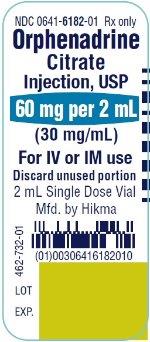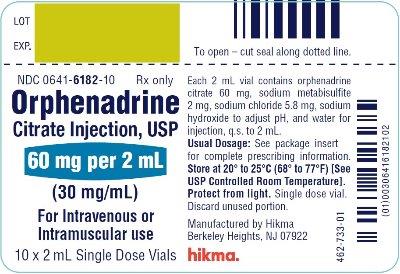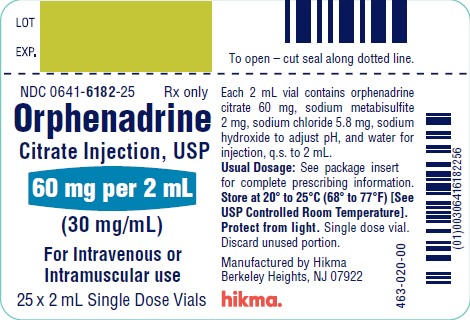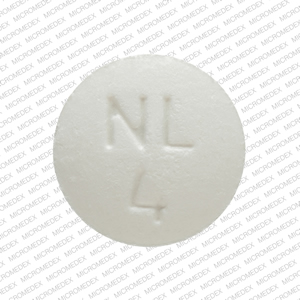Orphenadrine Injection: Package Insert / Prescribing Info
Package insert / product label
Generic name: orphenadrine citrate
Dosage form: injection
Drug class: Skeletal muscle relaxants
J Code (medical billing code): J2360 (Up to 60 mg, injection)
Medically reviewed by Drugs.com. Last updated on Aug 12, 2024.
On This Page
Orphenadrine Injection Description
Orphenadrine citrate is the citrate salt of orphenadrine (±)-N,N-dimethyl-2-[(o-methyl-α-phenylbenzyl)oxy]-ethylamine citrate (1:1). It occurs as a white, crystalline powder having a bitter taste. It is practically odorless; sparingly soluble in water, slightly soluble in alcohol.
Each vial contains 60 mg of orphenadrine citrate in aqueous solution. Each vial also contains: sodium metabisulfite, 2 mg; sodium chloride, 5.8 mg; sodium hydroxide, to adjust pH; and water for injection, q.s. to 2 mL. The structural formula is:

C18H23NO•C6H8O7 MW 461.50
Orphenadrine Injection - Clinical Pharmacology
The mode of therapeutic action has not been clearly identified, but may be related to its analgesic properties. Orphenadrine citrate does not directly relax tense muscles in man. Orphenadrine citrate also possesses anticholinergic actions.
Indications and Usage for Orphenadrine Injection
Orphenadrine citrate is indicated as an adjunct to rest, physical therapy, and other measures for the relief of discomfort associated with acute painful musculoskeletal conditions.
Contraindications
Contraindicated in patients with glaucoma, pyloric or duodenal obstruction, stenosing peptic ulcers, prostatic hypertrophy or obstruction of the bladder neck, cardio-spasm (megaesophagus) and myasthenia gravis.
Contraindicated in patients who have demonstrated a previous hypersensitivity to the drug.
Warnings
Some patients may experience transient episodes of light-headedness, dizziness or syncope. Orphenadrine citrate may impair the ability of the patient to engage in potentially hazardous activities such as operating machinery or driving a motor vehicle; ambulatory patients should therefore be cautioned accordingly.
Orphenadrine citrate injection contains sodium metabisulfite, a sulfite that may cause allergic-type reactions including anaphylactic symptoms and life-threatening or less severe asthmatic episodes in certain susceptible people. The overall prevalence of sulfite sensitivity in the general population is unknown and probably low. Sulfite sensitivity is seen more frequently in asthmatic than nonasthmatic people.
Precautions
Confusion, anxiety and tremors have been reported in few patients receiving propoxyphene and orphenadrine concomitantly. As these symptoms may be simply due to an additive effect, reduction of dosage and/or discontinuation of one or both agents is recommended in such cases.
Orphenadrine citrate should be used with caution in patients with tachycardia, cardiac decompensation, coronary insufficiency, cardiac arrhythmias.
Safety of continuous long-term therapy with orphenadrine has not been established. Therefore, if orphenadrine is prescribed for prolonged use, periodic monitoring of blood, urine and liver function values is recommended.
Pregnancy
Teratogenic Effects
Pregnancy Category C
Animal reproduction studies have not been conducted with orphenadrine. It is also not known whether orphenadrine can cause fetal harm when administered to a pregnant woman or can affect reproduction capacity. Orphenadrine should be given to a pregnant woman only if clearly needed.
Adverse Reactions/Side Effects
Adverse reactions of orphenadrine are mainly due to the mild anticholinergic action of orphenadrine, and are usually associated with higher dosage. Dryness of the mouth is usually the first adverse effect to appear. When the daily dose is increased, possible adverse effects include: tachycardia, palpitation, urinary hesitancy or retention, blurred vision, dilatation of pupils, increased ocular tension, weakness, nausea, vomiting, headache, dizziness, constipation, drowsiness, hypersensitivity reactions, pruritus, hallucinations, agitation, tremor, gastric irritation, and rarely urticaria and other dermatoses. Infrequently, an elderly patient may experience some degree of mental confusion. These adverse reactions can usually be eliminated by reduction in dosage. Very rare cases of aplastic anemia associated with the use of orphenadrine tablets have been reported. No causal relationship has been established.
Rare instances of anaphylactic reaction have been reported associated with the intramuscular injection of orphenadrine citrate.
Drug Abuse and Dependence
Orphenadrine has been chronically abused for its euphoric effects. The mood elevating effects may occur at therapeutic doses of orphenadrine.
Overdosage
Orphenadrine is toxic when overdosed and typically induces anticholinergic effects. In a review of orphenadrine toxicity, the minimum lethal dose was found to be 2 to 3 grams for adults; however, the range of toxicity is variable and unpredictable. Treatment for orphenadrine overdose is evacuation of stomach contents (when necessary), charcoal at repeated doses, intensive monitoring, and appropriate supportive treatment of any emergent anticholinergic effects.
Orphenadrine Injection Dosage and Administration
Adults - One 2 mL vial (60 mg) intravenously or intramuscularly; may be repeated every 12 hours. Relief may be maintained by one (100 mg) orphenadrine citrate tablet twice daily.
Parenteral drug products should be inspected visually for particulate matter, whenever solution and container permit.
How is Orphenadrine Injection supplied
Orphenadrine Citrate Injection, USP is supplied as follows:
Cartons of 10 (NDC 0641-6182-10) 2 mL vials, each vial containing 60 mg of orphenadrine citrate in aqueous solution.
Cartons of 25 (NDC 0641-6182-25) 2 mL vials, each vial containing 60 mg of orphenadrine citrate in aqueous solution.
Storage
Store at 20° to 25°C (68° to 77°F) [See USP Controlled Room Temperature].
Protect from light.
Single dose vial. Discard unused portion.
To report SUSPECTED ADVERSE REACTIONS, contact Hikma Pharmaceuticals USA Inc. at 1-877-845-0689, or the FDA at 1-800-FDA-1088 or www.fda.gov/medwatch.
For Product Inquiry call 1-877-845-0689.
Manufactured by:
Hikma Pharmaceuticals USA Inc.
Berkeley Heights, NJ 07922
Revised May 2023
462-734-02
PRINCIPAL DISPLAY PANEL - CONTAINER
NDC 0641-6182-01 Rx only
Orphenadrine
Citrate
Injection, USP
60 mg per 2 mL
(30 mg/mL)
For IV or IM use
Discard unused portion
2 mL Single Dose Vial

PRINCIPAL DISPLAY PANEL -SHELF PACK
NDC 0641-6182-10 Rx only
Orphenadrine
Citrate Injection, USP
60 mg per 2 mL
(30 mg/mL)
For Intravenous or
Intramuscular use
10 x 2 mL Single Dose Vials

NDC 0641-6182-25 Rx only
Orphenadrine
Citrate Injection, USP
60 mg per 2 mL
(30 mg/mL)
For Intravenous or
Intramuscular use
25 x 2 mL Single Dose Vials

| ORPHENADRINE CITRATE
orphenadrine citrate injection |
|||||||||||||||||||||||||
|
|||||||||||||||||||||||||
|
|||||||||||||||||||||||||
|
|||||||||||||||||||||||||
|
|||||||||||||||||||||||||
|
|||||||||||||||||||||||||
| Labeler - Hikma Pharmaceuticals USA Inc. (946499746) |
More about orphenadrine
- Check interactions
- Compare alternatives
- Pricing & coupons
- Reviews (83)
- Drug images
- Latest FDA alerts (1)
- Side effects
- Dosage information
- During pregnancy
- Drug class: skeletal muscle relaxants
- Breastfeeding
- En español

